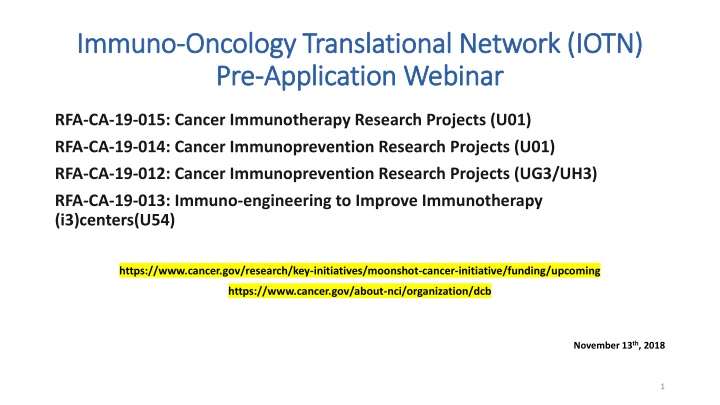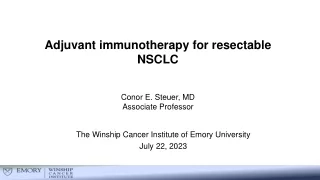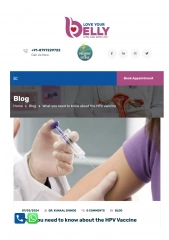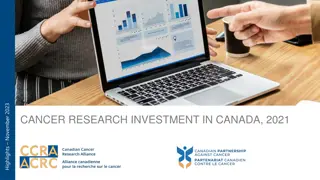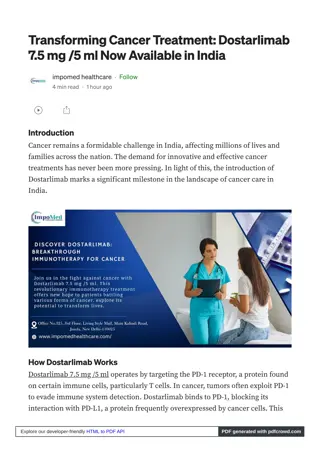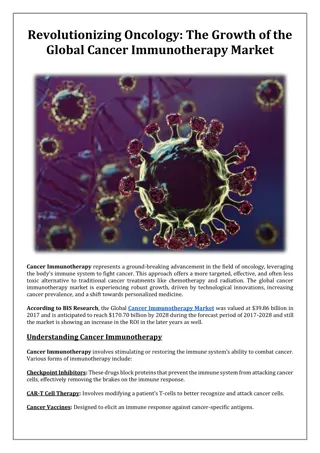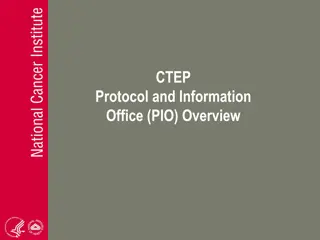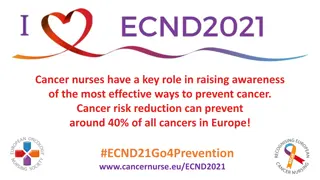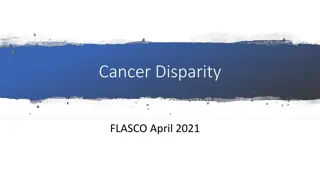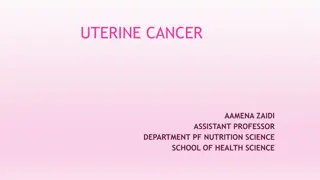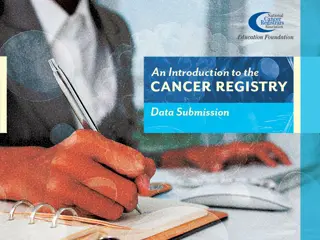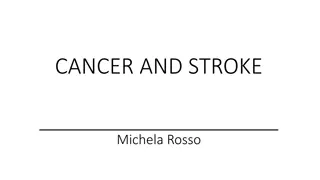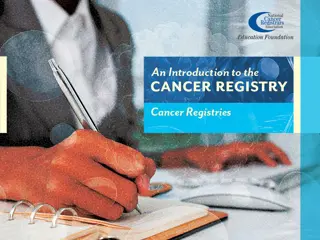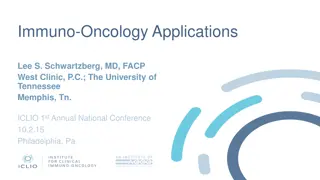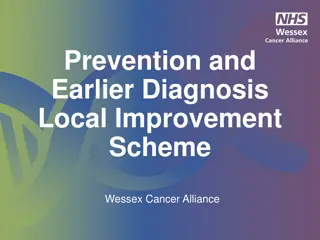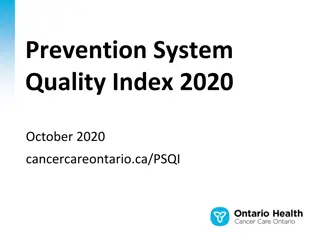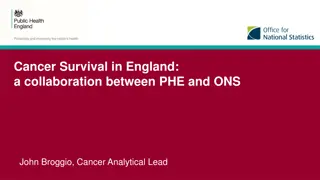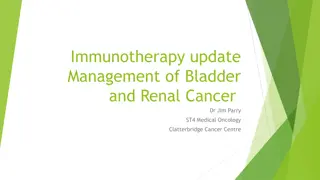Advancing Cancer Immunotherapy and Prevention Initiatives
Advancements in cancer immunotherapy and prevention through the Immuno-Oncology Translational Network (IOTN). Explore Blue Ribbon Panel recommendations and implementation plans dedicated to improving immunotherapy outcomes and developing preventive vaccines. Consortium structural insights are also highlighted.
Download Presentation

Please find below an Image/Link to download the presentation.
The content on the website is provided AS IS for your information and personal use only. It may not be sold, licensed, or shared on other websites without obtaining consent from the author.If you encounter any issues during the download, it is possible that the publisher has removed the file from their server.
You are allowed to download the files provided on this website for personal or commercial use, subject to the condition that they are used lawfully. All files are the property of their respective owners.
The content on the website is provided AS IS for your information and personal use only. It may not be sold, licensed, or shared on other websites without obtaining consent from the author.
E N D
Presentation Transcript
Immuno Immuno- -Oncology Translational Network (IOTN) Oncology Translational Network (IOTN) Pre Pre- -Application Webinar Application Webinar RFA-CA-19-015: Cancer Immunotherapy Research Projects (U01) RFA-CA-19-014: Cancer Immunoprevention Research Projects (U01) RFA-CA-19-012: Cancer Immunoprevention Research Projects (UG3/UH3) RFA-CA-19-013: Immuno-engineering to Improve Immunotherapy (i3)centers(U54) https://www.cancer.gov/research/key-initiatives/moonshot-cancer-initiative/funding/upcoming https://www.cancer.gov/about-nci/organization/dcb November 13th, 2018 1
Blue Ribbon Panel Recommendations Blue Ribbon Panel Recommendations A. Establish a network for direct patient involvement B. Create a translational science network devoted to immunotherapy C. Develop ways to overcome resistance to therapy D. Build a national cancer data ecosystem E. Intensify research on the major drivers of childhood cancer F. Minimize cancer treatment s debilitating side effects G. Expand use of proven prevention and early detection strategies H. Mine past patient data to predict future patient outcomes I. Develop a 3D cancer atlas J. Develop new cancer technologies 2
Blue Ribbon Panel Blue Ribbon Panel Recommendation B Recommendation B The implementation plan outlined a network focused on: o Discovering and evaluating novel immune-based approaches to increase the number of patients that benefit from immunotherapy; and o developing vaccines to prevent cancers of all types. 3
Immuno Immuno- -Oncology Translational Network Oncology Translational Network Blue Ribbon Panel Immunotherapy and Prevention Accelerate translation of basic discoveries to clinical applications to improve immunotherapy outcomes for both hot and cold cancers - and to prevent cancers before they occur. Recommendation: Create a translational science network devoted to immunotherapy Implementation Plan: Build a collaborative network focused on: o Discovering and evaluating novel immune-based approaches to increase the number of patients that benefit from immunotherapy; and o Developing and validating early intervention vaccines to prevent cancers of all types o Incorporating multi-disciplinary approaches to improve immunotherapy 4
Immuno Immuno- -Oncology Translational Network (IOTN) Oncology Translational Network (IOTN) - - Consortium Structure Consortium Structure - - 5
Immuno Immuno- -Oncology Translational Network: RFAs Oncology Translational Network: RFAs RFA-CA-19-015: Cancer Immunotherapy Research Projects (U01) RFA-CA-19-014: Cancer Immunoprevention Research Projects (U01) RFA-CA-19-012: Cancer Immunoprevention Research Projects (UG3/UH3) (new) RFA-CA-19-013: Immuno-engineering to Improve Immunotherapy (i3) Centers(U54) (new) 6
Common Elements Common Elements - - Key Dates Key Dates Standard elements: o Letter of Intent Due Date o Application Due Dates o RFA-CA-19-014, RFA-CA-19-015 o RFA-CA-19-012, RFA-CA-19-013 by 5:00 PM local time of applicant organization it s highly recommended to submit early! o No late applications will be accepted o Scientific Merit Review o Advisory Council Review o Earliest Start Date One month prior to due date February 8, 2019 February 11, 2019 April/May 2019 August 2019 September 2019 7
Common Elements Common Elements - - Letter of Intent (LOI) Letter of Intent (LOI) LOI: Highly encouraged, but not required. Not binding and does not enter into the review. Important for staff to define the scope of expertise needed by peer reviewers. Standard elements: o Descriptive title of the project o Name(s), address(es), telephone number(s) of the PD(s)/PI(s) o Names of other key personnel o Participating Institution(s) o Number and title of the funding opportunity Additional recommended information: o Provide a brief (3-5 sentence) description of the project o Include relevant reviewer expertise for review of the application and Keywords 8
Common Elements Common Elements Cooperative Agreement Cooperative Agreement o All RFAs use the cooperative agreement U-mechanism. o Grantees will be expected to actively participate in a IOTN Consortium. o PIs will serve on the Consortium Steering Committee to discuss community issues, set policies, and plan and evaluate activities to meet program goals. o The Steering Committee will meet regularly by teleconference, and Consortium members will meet in person at an Annual Program Meeting. PIs should include budget for travel. o Read cooperative agreement terms carefully. 9
Cancer Moonshot Data Sharing and Health Disparity Research Cancer Moonshot Data Sharing and Health Disparity Research o Utilizing the provision outlined in the 21st Century Cures Act, NCI has established a data sharing strategy that requires public access immediately upon publication of all research results and underlying data for projects that are funded as part of the Beau Biden Cancer Moonshot Initiative: https://www.cancer.gov/research/key-initiatives/moonshot-cancer- initiative/funding/public-access-policy o The data sharing plan will become terms and conditions of award. o If applicable, address how the proposed studies have potential to reduce cancer burden in diverse populations, including minority and underserved populations. 10
Immuno Immuno- -Oncology Translational Network (IOTN) Oncology Translational Network (IOTN) Pre Pre- -Application Webinar Application Webinar Cancer Immunotherapy Research Projects (U01) Research Projects (U01) Cancer Immunotherapy RFA-CA-19-015: Cancer Immunotherapy Research Projects (U01) (re-issue of RFA-CA-17-045) Nancy Boudreau, Ph.D. Division of Cancer Biology, NCI Minkyung Song, Ph.D. Division of Cancer Treatment and Diagnosis, NCI 11
Cancer Immunotherapy Research Projects (U01): Objectives Cancer Immunotherapy Research Projects (U01): Objectives Objectives: o Define immune interactions in tumor microenvironments. o Identify novel immune checkpoints, tumor-specific T cell receptors and their cognate tumor targets (neoantigens). o Uncover intrinsic and extrinsic resistance pathways. o Test improved immunotherapies, (vaccines, checkpoint inhibitors, cellular or viral therapies, bispecific antibodies) o Studies should be largely pre-clinical involving clinically- relevant models and endpoints for rapid translation. 12 RFA-CA-19-015: Cancer Immunotherapy Research Projects (U01)
Cancer Immunotherapy Research Projects (U01): Tumor Types Cancer Immunotherapy Research Projects (U01): Tumor Types oApplications focused on all adult tumor types permitted oApplications focused on Lung, Ovarian, Breast, and Colorectal Cancers may be prioritized to align with Human Tumor Atlas network oPancreatic and other cancer applications are also permitted in this re-issued RFA 13 RFA-CA-19-015: Cancer Immunotherapy Research Projects (U01)
Cancer Immunotherapy Research Projects (U01): Scientific Goals Cancer Immunotherapy Research Projects (U01): Scientific Goals Scientific Goals of the Cancer Immunotherapy Projects o Define factors underlying escape from immune surveillance o Improve antigen presentation and priming of anti-tumor cytotoxic T cells o Discovery and optimization of novel immunotherapies and/or combinations o Investigate mechanisms of acquired resistance following immunotherapy o Identify adjuvant therapies that target the gut microbiome to enhance anti-tumor efficacy or reduce toxicity of immunotherapies o Identify effective immunotherapy approaches in both the periphery and the CNS o Avoiding or reducing off-target or immune-related adverse events 14
Cancer Immunotherapy Research Projects (U01): Cancer Immunotherapy Research Projects (U01): Research Topics of Interest to Partnering NIH Institutes Research Topics of Interest to Partnering NIH Institutes Research Topics of Interest to PartneringNIH Institutes National Institute on Alcohol Abuse and Alcoholism (NIAAA) o Applications that have the potential to identify the role played by alcohol use on intrinsic resistance mechanisms and generation of an immunosuppressive tumor microenvironment that influence alcohol-induced cancers, and to accelerate the development of guidelines to improve outcomes of immunotherapy for these forms of cancer National Institute of Dental and Craniofacial Research (NIDCR) o Research that aims to treat head and neck squamous cell carcinomas (HNSCC) through stimulation of the immune response focusing on checkpoint inhibition, adoptive T cell transfer, and vaccine therapies National Institute of Environmental Health Sciences (NIEHS) o Applications that explore how environmental exposures might affect cancer immunotherapy outcomes; Animal studies exploring the interaction of common environmental toxicants with cancer immunotherapies that would inform subsequent human clinical trials o National Institute of Neurological Disorders and Stroke (NINDS) o Research on development of immunotherapies for primary brain tumor 3 National Institute of Allergy and Infectious Diseases (NIAID) o Applications that propose to: identify innate and adaptive immune mechanisms that can be manipulated to reduce immune-related adverse events (irAEs); evaluate host factors (e.g., genetics, epigenetics) associated with the risk of developing irAEs; and identify new immune targets for immunotherapy and their mechanism of action 15 RFA-CA-19-015: Cancer Immunotherapy Research Projects (U01), Part 2. Section I.
Cancer Immunotherapy Research Projects (U01): Cancer Immunotherapy Research Projects (U01): Budget, Mechanism and Eligibility Budget, Mechanism and Eligibility Budget, Mechanism, and Eligibility o Direct Costs: Application budgets are limited to $500,000 in Direct Costs per year. o Anticipated # of Awards: The NCI intends to fund 8-9 awards. o Project Period: A project period of 5 years must be requested. o Mechanism: A U01 Research Project - Cooperative Agreement. o Eligibility: Foreign Institutions are not eligible to apply; foreign components are allowed. o All applications must be received by Feb. 8, 2019 No Late applications will be accepted. 16 RFA-CA-19-015: Cancer Immunotherapy Research Projects (U01)
Cancer Immunotherapy Research Projects (U01): Revised Applications Cancer Immunotherapy Research Projects (U01): Revised Applications Revised applications previously submitted in response to RFA-CA-17-045 are permitted/encouraged Revised applications can include a one page introduction to address previous critiques Revised applications must be submitted by the February 8, 2019 application deadline- no late applications will be accepted RFA-CA-19-015: Cancer Immunotherapy Research Projects (U01) 17
Cancer Immunotherapy Research Projects (U01): Scientific Review Cancer Immunotherapy Research Projects (U01): Scientific Review Scientific Review Scored Review Criteria: Significance, Investigator(s), Innovation, Approach, Environment Specific review elements for this FOA include: o Does the application propose innovative plans for leveraging expertise and resources, integrating clinically-relevant information, and utilizing relevant pre-clinical models that can accelerate translation of basic discoveries to improved clinical application of immunotherapeutic approaches? o How well do the proposed studies have potential to reduce cancer burden in diverse populations, including minority and underserved populations? o Are proposed studies appropriately powered, controlled, randomized, and blinded? o Which project resources could be potentially shared with the Cancer Immunotherapy Consortium, the IOTN and the broader scientific community? o Does the application address the NCI Cancer Moonshot Public Access and Data Sharing Policy? 18 RFA-CA-19-015: Cancer Immunotherapy Research Projects (U01)
Cancer Immunotherapy Research Projects (U01): Cancer Immunotherapy Research Projects (U01): Scientific/Research Contacts Scientific/Research Contacts Scientific/Research Contacts: Nancy Boudreau, Ph.D. National Cancer Institute (NCI) Phone: 240-276-6702 Email: nancy.boudreau@nih.gov Kimberly A. McAllister, Ph.D. National Institute of Environmental Health Sciences (NIEHS) Phone: 919-541-4528 Email: mcallis2@niehs.nih.gov Katarzyna (Kasia) Bourcier, PhD National Institute of Allergy and Infectious Disease (NIAID) Telephone: 240-627-3482 Email: bourcierkd@mail.nih.gov Minkyung Song, Ph.D. National Cancer Institute (NCI) Phone: 240-276-6139 Email: songm@mail.nih.gov Solita Chiayeng Wang, Ph.D. National Institute of Dental and Craniofacial Research (NIDCR) Phone: 301-827-4647 Email: chiayeng.wang@nih.gov Jane W. Fountain, Ph.D. National Institute of Neurological Disorders and Stroke (NINDS) Phone: 301-496-1431 Email: fountai@ninds.nih.gov Garry J. Murray, Ph.D. National Institute on Alcohol Abuse and Alcoholism (NIAAA) Phone: 310-443-9940 Email: gary.murray@nih.gov 19 RFA-CA-19-015: Cancer Immunotherapy Research Projects (U01)
Immuno Immuno- -Oncology Translational Network (IOTN) Oncology Translational Network (IOTN) Pre Pre- -Application Webinar Application Webinar Cancer Immunoprevention Research Projects (U01) Immunoprevention Research Projects (U01) Cancer RFA-CA-19-014: Cancer Immunoprevention Research Projects (U01) (re-issue of RFA-CA-17-046) Robert Shoemaker, Ph.D. Division of Cancer Prevention, NCI 20
Cancer Immunoprevention Research Projects (U01) Cancer Immunoprevention Research Projects (U01) Goal: Identify actionable targets arising in pre-cancerous lesions; develop and validate early intervention vaccines based on these targets. Strategy: Focus on cancers that occur in specific organ sites in high- risk cohorts. o Lynch Syndrome (colon and endometrial cancer) o Familial Adenomatous Polyposis (colon cancer) o BRCA1/2 Carriers (breast and ovarian cancer) o NF and TSC (neurologic and other cancers) o Other Genetic Predisposition Syndromes o Populations exposed to environmental carcinogens o Other definable high-risk cohorts 21
Cancer Immunoprevention Research Projects (U01): Scientific Goals Cancer Immunoprevention Research Projects (U01): Scientific Goals Scientific Goals of the Cancer Immunoprevention Projects o Define an experimental setting that enables the definition of changes in potential immune targets as a function of time during carcinogenesis. o Evaluate the validity of identified targets for immunoprevention as a function of time. o Devise interventions with practical potential for translational studies. o Produce the preclinical reagents necessary for demonstration of cancer preventive efficacy. o Demonstrate and reproduce preventive efficacy in preclinical models. 22 RFA-CA-19-014: Cancer Immunoprevention Research Projects (U01)
Cancer Immunoprevention Research Projects (U01): Cancer Immunoprevention Research Projects (U01): Budget, Mechanism, and Eligibility Budget, Mechanism, and Eligibility Budget, Mechanism, and Eligibility o Direct Costs: Application budgets are limited to $500,000 in Direct Costs per year. o Anticipated # of Awards: The NCI intends to commit $3,4000,000 in total costs in FY 2019 to fund two to four awards. The number of awards is contingent upon NIH appropriations and the submission of meritorious applications. o Project Period: A project period of 5 years must be requested. o Mechanism: A U01 resource-related cooperative agreement. o Eligibility: Foreign Institutions are not eligible to apply; foreign components are allowed o Revised applications (initially submitted in response to RFA-CA-17-046) are permitted/encouraged along with one page introduction to the revised application o All applications must be submitted by Feb. 8, 2019-no late applications will be accepted 23 RFA-CA-19-014: Cancer Immunoprevention Research Projects (U01)
Cancer Immunoprevention Research Projects (U01): Scientific Review Cancer Immunoprevention Research Projects (U01): Scientific Review Scientific Review Scored Review Criteria: Significance, Investigator(s), Innovation, Approach, Environment Specific review elements for this FOA include: o Are the high-risk cohorts addressed by this application well-defined? o Is there potential for mechanism-based cancer preventive intervention development? o Does the application contain acceptable plans for addressing the NCI Cancer Moonshot Public Access and Data Sharing Policy 24 RFA-CA-19-014: Cancer Immunoprevention Research Projects (U01)
Cancer Immunoprevention Research Projects (U01): Cancer Immunoprevention Research Projects (U01): Scientific/Research Contacts Scientific/Research Contacts Scientific/Research Contacts: Kimberly A. McAllister, Ph.D. National Institute of Environmental Health Sciences (NIEHS) Phone: 919-541-4528 Email: mcallis2@niehs.nih.gov Robert H. Shoemaker, Ph.D. National Cancer Institute (NCI) Phone: 240-276-7077 Email: Shoemakr@mail.nih.gov Solita Chiayeng Wang, Ph.D. National Institute of Dental and Craniofacial Research (NIDCR) Phone: 301-827-4647 Email: chiayeng.wang@nih.gov Jane W. Fountain, Ph.D. National Institute of Neurological Disorders and Stroke (NINDS) Phone: 301-496-1431 Email: fountai@ninds.nih.gov 25 RFA-CA-19-014: Cancer Immunoprevention Research Projects (U01)
Immuno Immuno- -Oncology Translational Network (IOTN) Oncology Translational Network (IOTN) Pre Pre- -Application Webinar Application Webinar Cancer Immunoprevention Research Projects (UG3/UH3) Immunoprevention Research Projects (UG3/UH3) Cancer RFA-CA-19-012: Cancer Immunoprevention Research Projects (UG3/UH3) Robert Shoemaker, Ph.D. Division of Cancer Prevention, NCI 26
Cancer Immunoprevention Research Projects (UG3/UH3) Cancer Immunoprevention Research Projects (UG3/UH3) Numerous investigators felt that they lacked sufficient preliminary data to submit a U01 application in response to RFA-CA-17-046. A UG3/UH3 phased mechanism would allow investigators interested in entering the immunoprevention field to submit compelling research proposals with little preliminary data. 27 RFA-CA-19-012: Cancer Immunoprevention Research Projects (UG3/UH3)
Cancer Immunoprevention Research Projects (UG3/UH3): Cancer Immunoprevention Research Projects (UG3/UH3): UG3 and UH3 Phases UG3 and UH3 Phases UG3 phase (2 yrs) enable investigators to pursue immune target discovery efforts without the requirement for substantial preliminary data. Projects that achieve specific milestones advance to the UH3 phase. UH3 phase (3 yrs) will support follow-on studies from successful UG3s (e.g. development and preclinical testing of interventions). NCI intends to commit $2,000,000 in total costs in FY2019 to fund two to three awards Award Budget: Applicants may request up to $500,000 (per year) direct costs for both the UG3 phase and UH3 phase. All applications are due by Feb. 11, 2019 28 RFA-CA-19-012: Cancer Immunoprevention Research Projects (UG3/UH3)
Cancer Immunoprevention Research Projects (UG3/UH3): Scientific Review Cancer Immunoprevention Research Projects (UG3/UH3): Scientific Review Scientific Review Scored Review Criteria: Significance, Investigator(s), Innovation, Approach, Environment Specific review elements for this FOA include: o Are the high-risk cohorts addressed by this application well-defined? o Is there potential for mechanism-based cancer preventive intervention development? o Does the application contain acceptable plans for addressing the NCI Cancer Moonshot Public Access and Data Sharing Policy 29 RFA-CA-19-012: Cancer Immunoprevention Research Projects (UG3/UH3)
Cancer Immunoprevention Research Projects (UG3/UH3): Cancer Immunoprevention Research Projects (UG3/UH3): Scientific/Research Contacts Scientific/Research Contacts Scientific/Research Contacts: Robert H. Shoemaker, Ph.D. National Cancer Institute (NCI) Phone: 240-276-7077 Email: Shoemakr@mail.nih.gov 30 RFA-CA-19-012: Cancer Immunoprevention Research Projects (UG3/UH3)
Immuno Immuno- -Oncology Translational Network (IOTN) Oncology Translational Network (IOTN) Pre Pre- -Application Webinar Application Webinar Immuno Improve Immunotherapy (i3) Centers (U54) Improve Immunotherapy (i3) Centers (U54) Immuno- -engineering to engineering to RFA-CA-19-013: Immuno-engineering to Improve Immunotherapy (i3)Centers (U54) Kevin Howcroft, Ph.D. Division of Cancer Biology, NCI Minkyung Song, Ph.D. Division of Cancer Treatment and Diagnosis, NCI 31
Immuno Immuno- -Engineering to Improve Immunotherapy ( Engineering to Improve Immunotherapy (i3 i3) Centers: BRP Panel Recommendations BRP Panel Recommendations ) Centers: BRP panel recommendations o Accelerate translation of basic discoveries to clinical applications to improve immunotherapy outcomes for both hot and cold cancers o Enable precise control of desired immune responses that are more effective, safer, and more broadly available. o Encourage multi-disciplinary approaches to improve immunotherapy 32 RFA-CA-19-013: Immuno-engineering to Improve Immunotherapy (i3) Centers (U54)
Immuno Immuno- -Engineering to Improve Immunotherapy ( Engineering to Improve Immunotherapy (i3 i3) Centers ) Centers Goal: o Support multi-disciplinary teams that incorporate bioengineering and systems biology approaches in the IOTN framework. o Quantitatively understand the physical basis of immune system function o Build predictive models o Regenerate compromised immune systems for therapeutic benefit o Enable precise control of desired immune responses that are more effective, safer, and more broadly available. 33 RFA-CA-19-013: Immuno-engineering to Improve Immunotherapy (i3) Centers (U54)
Immuno Immuno- -Engineering to Improve Immunotherapy ( Engineering to Improve Immunotherapy (i3 i3) Centers: Structure ) Centers: Structure i3 Centers should consist of multi-disciplinary teams that incorporate cancer biology, bioengineering and/or systems biology approaches. The i3 centers will contribute to and support the IOTN, using a U54 mechanism, Up to 3 Projects in each center: Examples oartificial APCs and/or lymphoid structures obiomaterials to control how, where, and when immune cells are stimulated in vivo onext-gen gene editing and cell therapy engineering o universal immune effector cells oimproved multi-specific proteins & scaffolds for safe and effective engagement of immune cells with tumor cells omodeling/predictive analyses of immune response attributes to cancer, cancer vaccines, or other immunomodulatory interventions or responses to therapy. oThe projects in any one i3 Center will be synergistic. Each center must also include an Administrative Core: oManage and coordinate the Center s research activity oLiaison between each IOTN i3 Center and IOTN U01s. 34
Immuno Immuno- -Engineering to Improve Immunotherapy ( Engineering to Improve Immunotherapy (i3 i3) Centers: Budget, Mechanism, and Eligibility Budget, Mechanism, and Eligibility ) Centers: Budget, Mechanism, and Eligibility o Direct Costs: Application budgets are limited to $900,000 in Direct Costs per year. o Anticipated # of Awards: The NCI intends to fund 2-4 awards. o Project Period: A project period of 5 years must be requested. o Mechanism: A U54 Research Center - Cooperative Agreement. o Eligibility: Foreign Institutions are not eligible to apply; foreign components are allowed. o Continuous submission policies do not apply -all grants must be received by Feb. 11, 2019 Partnering ICs: NIA and NIBIB 35 RFA-CA-19-013: Immuno-engineering to Improve Immunotherapy (i3) Centers (U54)
Immuno Immuno- -Engineering to Improve Immunotherapy ( Engineering to Improve Immunotherapy (i3 i3) Centers: Scientific/Research Contacts Scientific/Research Contacts ) Centers: Scientific/Research Contacts: Peer Review Contact: Kevin Howcroft, Ph.D. Division of Cancer Biology National Cancer Institute (NCI) Phone: 240-276-6229 Email: Howcrofk@mail.nih.gov Rebecca Fuldner, Ph.D. National Institute on Aging (NIA) Phone: 301-496-6402 Email: fuldnerr@nia.nih.gov Referral Officer Division of Extramural Activities (DEA) Phone: 240-276-6390 Email: ncirefof@dea.nci.nih.gov David Rampulla, Ph.D. National Institute of Biomedical Imaging and Bioengineering (NIBIB) Phone: 301-451-4774 Email: David.Rampulla@nih.gov Minkyung Song, Ph.D. National Cancer Institute (NCI) Phone: 240-276-6139 Email: songm@mail.nih.gov 36
Immuno Immuno- -Oncology Translational Network Oncology Translational Network Questions? Questions? Questions? 37
